#train ai
Explore tagged Tumblr posts
Text
alternatives for ai to design ocs
hero forge
picrew
the fucking sims 4
your local furry artist
bitmoji
shitty photoshoped collage
DeviantArt bases
zepeto
making edits of your favorite character
searching "dress up game" on the app store
learning how to draw
#anti ai#“but im an uwu soft bean and i don't know how to draw”#then learn?#you know you can create right you are capable of more than just “consuming”#im not saying you need to train to be the best artist in the world or that you need to pursue a future in the art industry#you don't need to be perfect you just need to try#that feeling of needing things done right now only works to alienate you from the labor behind the things you love
28K notes
·
View notes
Text
I was meeting a client at a famous museum’s lounge for lunch (fancy, I know) and had an hour to kill afterwards so I joined the first random docent tour I could find. The woman who took us around was a great-grandmother from the Bronx “back when that was nothing to brag about” and she was doing a talk on alternative mediums within art.
What I thought that meant: telling us about unique sculpture materials and paint mixtures.
What that actually meant: an 84yo woman gingerly holding a beautifully beaded and embroidered dress (apparently from Ukraine and at least 200 years old) and, with tears in her eyes, showing how each individual thread was spun by hand and weaved into place on a cottage floor loom, with bright blue silk embroidery thread and hand-blown beads intricately piercing the work of other labor for days upon days, as the labor of a dozen talented people came together to make something so beautiful for a village girl’s wedding day.
What it also meant: in 1948, a young girl lived in a cramped tenement-like third floor apartment in Manhattan, with a father who had just joined them after not having been allowed to escape through Poland with his pregnant wife nine years earlier. She sits in her father’s lap and watches with wide, quiet eyes as her mother’s deft hands fly across fabric with bright blue silk thread (echoing hands from over a century years earlier). Thread that her mother had salvaged from white embroidery scraps at the tailor’s shop where she worked and spent the last few days carefully dying in the kitchen sink and drying on the roof.
The dress is in the traditional Hungarian fashion and is folded across her mother’s lap: her mother doesn’t had a pattern, but she doesn’t need one to make her daughter’s dress for the fifth grade dance. The dress would end up differing significantly from the pure white, petticoated first communion dresses worn by her daughter’s majority-Catholic classmates, but the young girl would love it all the more for its uniqueness and bright blue thread.
And now, that same young girl (and maybe also the villager from 19th century Ukraine) stands in front of us, trying not to clutch the old fabric too hard as her voice shakes with the emotion of all the love and humanity that is poured into the labor of art. The village girl and the girl in the Bronx were very different people: different centuries, different religions, different ages, and different continents. But the love in the stitches and beads on their dresses was the same. And she tells us that when we look at the labor of art, we don’t just see the work to create that piece - we see the labor of our own creations and the creations of others for us, and the value in something so seemingly frivolous.
But, maybe more importantly, she says that we only admire this piece in a museum because it happened to survive the love of the wearer and those who owned it afterwards, but there have been quite literally billions of small, quiet works of art in billions of small, quiet homes all over the world, for millennia. That your grandmother’s quilt is used as a picnic blanket just as Van Gogh’s works hung in his poor friends’ hallways. That your father’s hand-painted model plane sets are displayed in your parents’ livingroom as Grecian vases are displayed in museums. That your older sister’s engineering drawings in a steady, fine-lined hand are akin to Da Vinci’s scribbles of flying machines.
I don’t think there’s any dramatic conclusions to be drawn from these thoughts - they’ve been echoed by thousands of other people across the centuries. However, if you ever feel bad for spending all of your time sewing, knitting, drawing, building lego sets, or whatever else - especially if you feel like you have to somehow monetize or show off your work online to justify your labor - please know that there’s an 84yo museum docent in the Bronx who would cry simply at the thought of you spending so much effort to quietly create something that’s beautiful to you.
#shut up e#long post#Saturday thoughts#this has been in my drafts for a week haha#also this is the heart of why AI art feels so wrong#forget the discussion of copyright and theft etc - even if models were only trained on public domain they would still feel very wrong#because they’re not art. art is the labor of creation#even commercial art and art commissioned by the popes and kings of history: there is humanity in the labor of it#unrelated: I did not know living in the Bronx was now something to brag about. How the fuck do y’all New Yorkers afford this city???
28K notes
·
View notes
Text
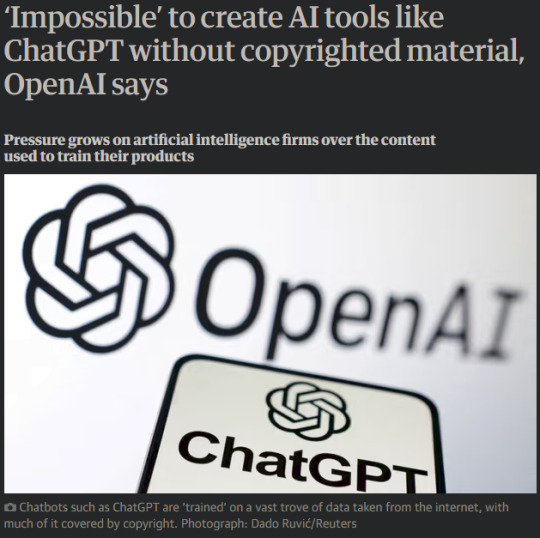
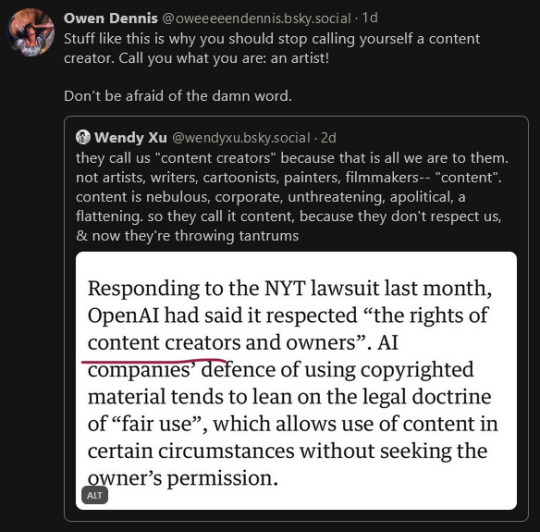
"content creator" is a corporate word.
we are artists.
#anti ai#fuck ai#artists on tumblr#please do not call me or any artist a content creator#i'm an artist. a fanartist. a designer. but not a content creator#ai clowns in my replies will be deleted and blocked without response so do not waste your breath#you are not an 'artist' for generating an image any more than you are a chef for ordering from a restaurant. someone Else did the work.#owen dennis just deleted all his blue sky stuff again and i hate that he does that because he makes such interesting comments#about the entertainment industry lmao i need to just. start screenshotting every smart thing he says#anyway thats why i decided to finally make this when its been sitting in drafts for a few months#owen dennis#edit - if you dont know who owen dennis is he's the creator of one of the best animated series of the last 20 years (Infinity Train)#he's very open about talking about art and the entertainment/animation industry on social media and in his newsletter and hes so cool 4 it
9K notes
·
View notes
Text
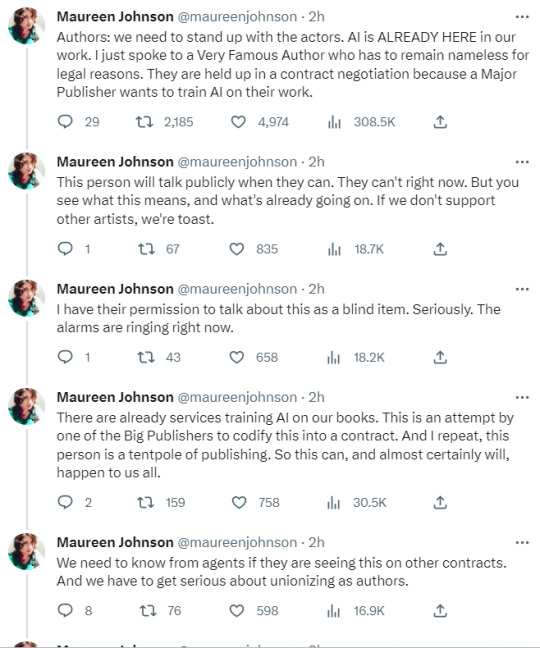
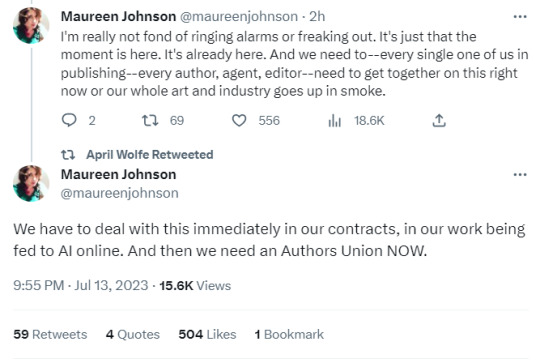
Alarm bells being rung by Maureen Johnson on AI and the Big Publishers
#I've already got academics wanting it put into their contracts that their work CAN'T be used to train AI#This is a scary time#ai MUST be regulated#on publishing#wga strike#sag aftra strike#sag-aftra strike#AUTHORS UNIONIZE
27K notes
·
View notes
Text






Another random comic diary. I have a really tiresome job I should be doing(commission comic about washing machines. really. x_x) so I am drawing a lot of other things to avoid working on it :3
#diary comic#train#I have no money from diary comic but drawing those...#feels so much better :D#I would leave washing machine comic to AI any day...#...but I would not have any reall income this month#like I am trying to draw take those commissions as challenge#but this on is too much#comic
4K notes
·
View notes
Text

#Vaporwave#aesthetic#ai art#digital art#colors#synthwave#lofi#nostalgia#retrowave#video game#concept art#art#dreamscape#unreality#city#subway#liminal#liminal spaces#neonwave#trains#cityscape#pink#train#metro#teal#bubblegumcore
5K notes
·
View notes
Text

Toothless with his markings💘
#httyd movies#httyd fandom#httyd fanart#httyd 2#httyd#httyd hiccup#toothless#httyd toothless#how to train your dragon#how to train you dragon: the hidden world#dragon art#artwork#art#drawing#no ai art
1K notes
·
View notes
Text
Sound on now Bambi! 💗
#bambi sleep#bimbo doll#bimbo hypnosis#bimbofied#bimboization#bimbo girl#bimbo training#bambification#bambi#ai bimbo
2K notes
·
View notes
Text
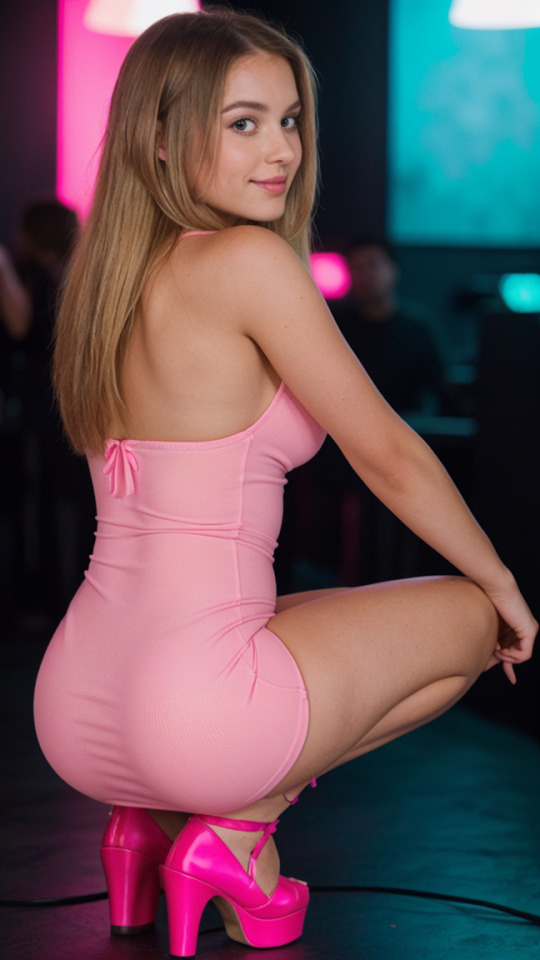
You love being pink at the club 🩷
#ai artwork#ai generated#ai girl#ai image#bimbo doll#bimboification#bimbo training#pink aesthetic#pink#pinkcore
4K notes
·
View notes
Text
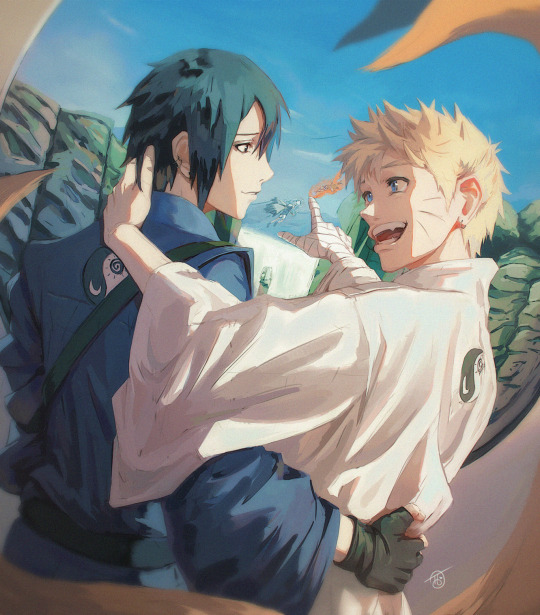
Happy 3/7day 🥰~! 'One day we'll look back on all these memories and smile about it'
Process + detail:
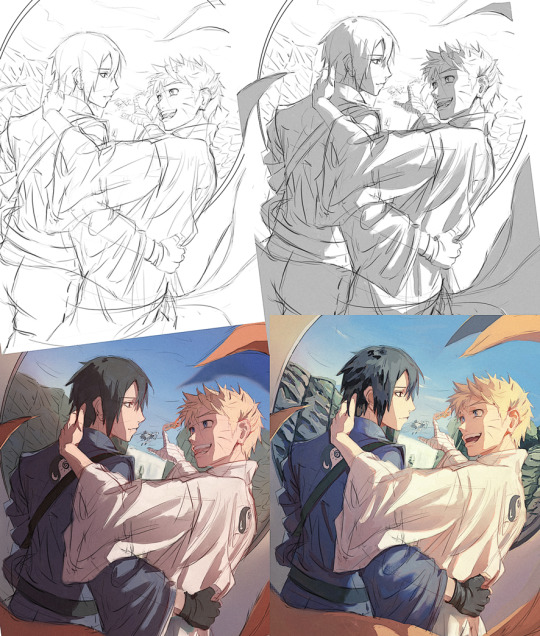
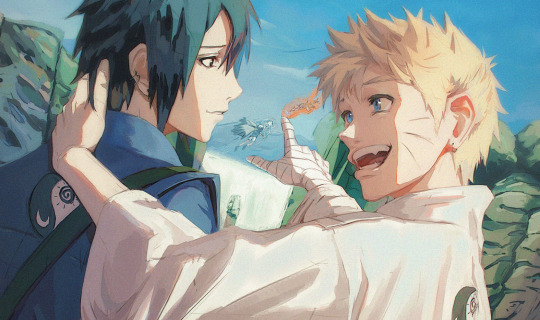
#my art#sasunaru#sns#sasuke x naruto#sasunaru day#sasunaru fanart#I'll post this for now since it's a special day~#but I'm seriously going to think about this whole art posting...#regarding ai and all#I mentioned it briefly before#but ai literally ruined the 2 biggest projects I was asked to work on#and another that I was going to work on#I had another opportunity here where I was going to get paid#for drawings somewhat regularly#but instead the offer changed to paying for my art#only to be trained for ai#so that didn't happen either#I shall not complain too much#I'm just amazed at the careless way some talk about it#because IT IS ruining lives and careers#ai IS already very advanced#:((
2K notes
·
View notes
Text
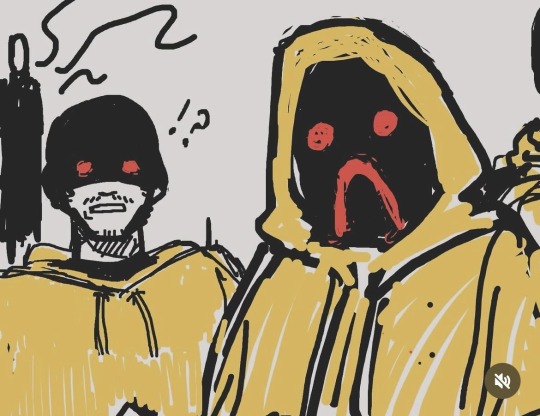
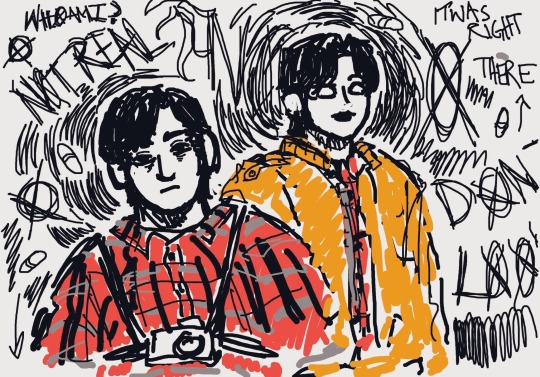
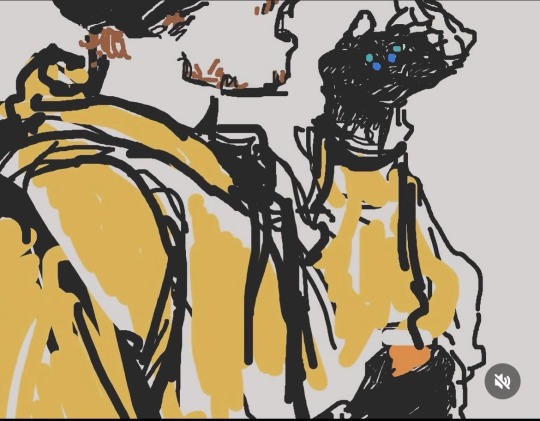
#going to post my Twitter art here because far as I’ve heard they’re changing the ability to opt your images out of training generative ai#marble hornets#mh#hoodie marble hornets#mh hoody#tim wright#mh Tim#brian thomas#mh brian#doodle tier
773 notes
·
View notes
Text
0 notes
Text
Penguin Random House, AI, and writers’ rights
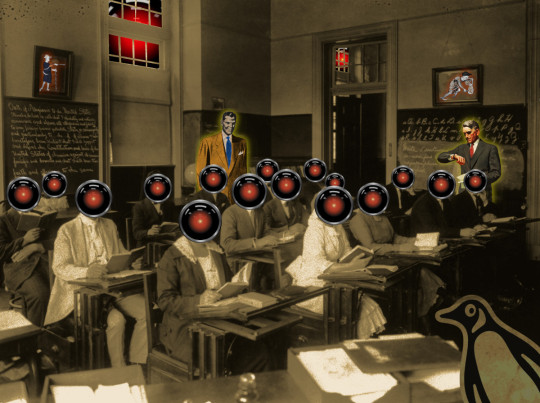
NEXT WEDNESDAY (October 23) at 7PM, I'll be in DECATUR, GEORGIA, presenting my novel THE BEZZLE at EAGLE EYE BOOKS.

My friend Teresa Nielsen Hayden is a wellspring of wise sayings, like "you're not responsible for what you do in other people's dreams," and my all time favorite, from the Napster era: "Just because you're on their side, it doesn't mean they're on your side."
The record labels hated Napster, and so did many musicians, and when those musicians sided with their labels in the legal and public relations campaigns against file-sharing, they lent both legal and public legitimacy to the labels' cause, which ultimately prevailed.
But the labels weren't on musicians' side. The demise of Napster and with it, the idea of a blanket-license system for internet music distribution (similar to the systems for radio, live performance, and canned music at venues and shops) firmly established that new services must obtain permission from the labels in order to operate.
That era is very good for the labels. The three-label cartel – Universal, Warner and Sony – was in a position to dictate terms like Spotify, who handed over billions of dollars worth of stock, and let the Big Three co-design the royalty scheme that Spotify would operate under.
If you know anything about Spotify payments, it's probably this: they are extremely unfavorable to artists. This is true – but that doesn't mean it's unfavorable to the Big Three labels. The Big Three get guaranteed monthly payments (much of which is booked as "unattributable royalties" that the labels can disperse or keep as they see fit), along with free inclusion on key playlists and other valuable services. What's more, the ultra-low payouts to artists increase the value of the labels' stock in Spotify, since the less Spotify has to pay for music, the better it looks to investors.
The Big Three – who own 70% of all music ever recorded, thanks to an orgy of mergers – make up the shortfall from these low per-stream rates with guaranteed payments and promo.
But the indy labels and musicians that account for the remaining 30% are out in the cold. They are locked into the same fractional-penny-per-stream royalty scheme as the Big Three, but they don't get gigantic monthly cash guarantees, and they have to pay the playlist placement the Big Three get for free.
Just because you're on their side, it doesn't mean they're on your side:
https://pluralistic.net/2022/09/12/streaming-doesnt-pay/#stunt-publishing
In a very important, material sense, creative workers – writers, filmmakers, photographers, illustrators, painters and musicians – are not on the same side as the labels, agencies, studios and publishers that bring our work to market. Those companies are not charities; they are driven to maximize profits and an important way to do that is to reduce costs, including and especially the cost of paying us for our work.
It's easy to miss this fact because the workers at these giant entertainment companies are our class allies. The same impulse to constrain payments to writers is in play when entertainment companies think about how much they pay editors, assistants, publicists, and the mail-room staff. These are the people that creative workers deal with on a day to day basis, and they are on our side, by and large, and it's easy to conflate these people with their employers.
This class war need not be the central fact of creative workers' relationship with our publishers, labels, studios, etc. When there are lots of these entertainment companies, they compete with one another for our work (and for the labor of the workers who bring that work to market), which increases our share of the profit our work produces.
But we live in an era of extreme market concentration in every sector, including entertainment, where we deal with five publishers, four studios, three labels, two ad-tech companies and a single company that controls all the ebooks and audiobooks. That concentration makes it much harder for artists to bargain effectively with entertainments companies, and that means that it's possible -likely, even – for entertainment companies to gain market advantages that aren't shared with creative workers. In other words, when your field is dominated by a cartel, you may be on on their side, but they're almost certainly not on your side.
This week, Penguin Random House, the largest publisher in the history of the human race, made headlines when it changed the copyright notice in its books to ban AI training:
https://www.thebookseller.com/news/penguin-random-house-underscores-copyright-protection-in-ai-rebuff
The copyright page now includes this phrase:
No part of this book may be used or reproduced in any manner for the purpose of training artificial intelligence technologies or systems.
Many writers are celebrating this move as a victory for creative workers' rights over AI companies, who have raised hundreds of billions of dollars in part by promising our bosses that they can fire us and replace us with algorithms.
But these writers are assuming that just because they're on Penguin Random House's side, PRH is on their side. They're assuming that if PRH fights against AI companies training bots on their work for free, that this means PRH won't allow bots to be trained on their work at all.
This is a pretty naive take. What's far more likely is that PRH will use whatever legal rights it has to insist that AI companies pay it for the right to train chatbots on the books we write. It is vanishingly unlikely that PRH will share that license money with the writers whose books are then shoveled into the bot's training-hopper. It's also extremely likely that PRH will try to use the output of chatbots to erode our wages, or fire us altogether and replace our work with AI slop.
This is speculation on my part, but it's informed speculation. Note that PRH did not announce that it would allow authors to assert the contractual right to block their work from being used to train a chatbot, or that it was offering authors a share of any training license fees, or a share of the income from anything produced by bots that are trained on our work.
Indeed, as publishing boiled itself down from the thirty-some mid-sized publishers that flourished when I was a baby writer into the Big Five that dominate the field today, their contracts have gotten notably, materially worse for writers:
https://pluralistic.net/2022/06/19/reasonable-agreement/
This is completely unsurprising. In any auction, the more serious bidders there are, the higher the final price will be. When there were thirty potential bidders for our work, we got a better deal on average than we do now, when there are at most five bidders.
Though this is self-evident, Penguin Random House insists that it's not true. Back when PRH was trying to buy Simon & Schuster (thereby reducing the Big Five publishers to the Big Four), they insisted that they would continue to bid against themselves, with editors at Simon & Schuster (a division of PRH) bidding against editors at Penguin (a division of PRH) and Random House (a division of PRH).
This is obvious nonsense, as Stephen King said when he testified against the merger (which was subsequently blocked by the court): "You might as well say you’re going to have a husband and wife bidding against each other for the same house. It would be sort of very gentlemanly and sort of, 'After you' and 'After you'":
https://apnews.com/article/stephen-king-government-and-politics-b3ab31d8d8369e7feed7ce454153a03c
Penguin Random House didn't become the largest publisher in history by publishing better books or doing better marketing. They attained their scale by buying out their rivals. The company is actually a kind of colony organism made up of dozens of once-independent publishers. Every one of those acquisitions reduced the bargaining power of writers, even writers who don't write for PRH, because the disappearance of a credible bidder for our work into the PRH corporate portfolio reduces the potential bidders for our work no matter who we're selling it to.
I predict that PRH will not allow its writers to add a clause to their contracts forbidding PRH from using their work to train an AI. That prediction is based on my direct experience with two of the other Big Five publishers, where I know for a fact that they point-blank refused to do this, and told the writer that any insistence on including this contract would lead to the offer being rescinded.
The Big Five have remarkably similar contracting terms. Or rather, unremarkably similar contracts, since concentrated industries tend to converge in their operational behavior. The Big Five are similar enough that it's generally understood that a writer who sues one of the Big Five publishers will likely find themselves blackballed at the rest.
My own agent gave me this advice when one of the Big Five stole more than $10,000 from me – canceled a project that I was part of because another person involved with it pulled out, and then took five figures out of the killfee specified in my contract, just because they could. My agent told me that even though I would certainly win that lawsuit, it would come at the cost of my career, since it would put me in bad odor with all of the Big Five.
The writers who are cheering on Penguin Random House's new copyright notice are operating under the mistaken belief that this will make it less likely that our bosses will buy an AI in hopes of replacing us with it:
https://pluralistic.net/2023/02/09/ai-monkeys-paw/#bullied-schoolkids
That's not true. Giving Penguin Random House the right to demand license fees for AI training will do nothing to reduce the likelihood that Penguin Random House will choose to buy an AI in hopes of eroding our wages or firing us.
But something else will! The US Copyright Office has issued a series of rulings, upheld by the courts, asserting that nothing made by an AI can be copyrighted. By statute and international treaty, copyright is a right reserved for works of human creativity (that's why the "monkey selfie" can't be copyrighted):
https://pluralistic.net/2023/08/20/everything-made-by-an-ai-is-in-the-public-domain/
All other things being equal, entertainment companies would prefer to pay creative workers as little as possible (or nothing at all) for our work. But as strong as their preference for reducing payments to artists is, they are far more committed to being able to control who can copy, sell and distribute the works they release.
In other words, when confronted with a choice of "We don't have to pay artists anymore" and "Anyone can sell or give away our products and we won't get a dime from it," entertainment companies will pay artists all day long.
Remember that dope everyone laughed at because he scammed his way into winning an art contest with some AI slop then got angry because people were copying "his" picture? That guy's insistence that his slop should be entitled to copyright is far more dangerous than the original scam of pretending that he painted the slop in the first place:
https://arstechnica.com/tech-policy/2024/10/artist-appeals-copyright-denial-for-prize-winning-ai-generated-work/
If PRH was intervening in these Copyright Office AI copyrightability cases to say AI works can't be copyrighted, that would be an instance where we were on their side and they were on our side. The day they submit an amicus brief or rulemaking comment supporting no-copyright-for-AI, I'll sing their praises to the heavens.
But this change to PRH's copyright notice won't improve writers' bank-balances. Giving writers the ability to control AI training isn't going to stop PRH and other giant entertainment companies from training AIs with our work. They'll just say, "If you don't sign away the right to train an AI with your work, we won't publish you."
The biggest predictor of how much money an artist sees from the exploitation of their work isn't how many exclusive rights we have, it's how much bargaining power we have. When you bargain against five publishers, four studios or three labels, any new rights you get from Congress or the courts is simply transferred to them the next time you negotiate a contract.
As Rebecca Giblin and I write in our 2022 book Chokepoint Capitalism:
Giving a creative worker more copyright is like giving your bullied schoolkid more lunch money. No matter how much you give them, the bullies will take it all. Give your kid enough lunch money and the bullies will be able to bribe the principle to look the other way. Keep giving that kid lunch money and the bullies will be able to launch a global appeal demanding more lunch money for hungry kids!
https://chokepointcapitalism.com/
As creative workers' fortunes have declined through the neoliberal era of mergers and consolidation, we've allowed ourselves to be distracted with campaigns to get us more copyright, rather than more bargaining power.
There are copyright policies that get us more bargaining power. Banning AI works from getting copyright gives us more bargaining power. After all, just because AI can't do our job, it doesn't follow that AI salesmen can't convince our bosses to fire us and replace us with incompetent AI:
https://pluralistic.net/2024/01/11/robots-stole-my-jerb/#computer-says-no
Then there's "copyright termination." Under the 1976 Copyright Act, creative workers can take back the copyright to their works after 35 years, even if they sign a contract giving up the copyright for its full term:
https://pluralistic.net/2021/09/26/take-it-back/
Creative workers from George Clinton to Stephen King to Stan Lee have converted this right to money – unlike, say, longer terms of copyright, which are simply transferred to entertainment companies through non-negotiable contractual clauses. Rather than joining our publishers in fighting for longer terms of copyright, we could be demanding shorter terms for copyright termination, say, the right to take back a popular book or song or movie or illustration after 14 years (as was the case in the original US copyright system), and resell it for more money as a risk-free, proven success.
Until then, remember, just because you're on their side, it doesn't mean they're on your side. They don't want to prevent AI slop from reducing your wages, they just want to make sure it's their AI slop puts you on the breadline.

Tor Books as just published two new, free LITTLE BROTHER stories: VIGILANT, about creepy surveillance in distance education; and SPILL, about oil pipelines and indigenous landback.
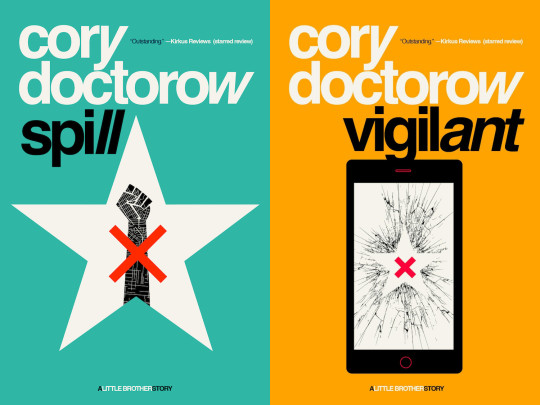

If you'd like an essay-formatted version of this post to read or share, here's a link to it on pluralistic.net, my surveillance-free, ad-free, tracker-free blog:
https://pluralistic.net/2024/10/19/gander-sauce/#just-because-youre-on-their-side-it-doesnt-mean-theyre-on-your-side

Image: Cryteria (modified) https://commons.wikimedia.org/wiki/File:HAL9000.svg
CC BY 3.0 https://creativecommons.org/licenses/by/3.0/deed.en
#pluralistic#publishing#penguin random house#prh#monopolies#chokepoint capitalism#fair use#AI#training#labor#artificial intelligence#scraping#book scanning#internet archive#reasonable agreements
708 notes
·
View notes
Text
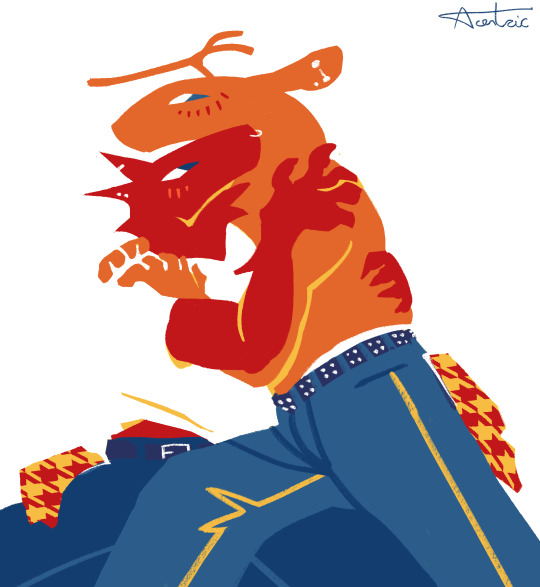
feels like pornography / watching you try on jeans
#steps out from behind a wall. hiiii im back#this is loosely referenced from one of those diesel ad photos ^_^#calming my mind by telling myself that my art is generally not useful for training on unless#they are going for my own specific style. which is unlikely. and thats assuming they violate my ''no ai thanks'' button#i mean look at this. nothing in this image is useful for teaching an ai how to draw a werewolf. lol#aceart#my art#furry#werewolf#werewolfisms#jeans#butch tag#original art
696 notes
·
View notes
Text
so in short
-> Glaze your art if you have the access to Glaze. the computing power for it is insane, it sucks, I know. cook dinner while your art glazes or go on a walk.
-> if you have the power necessary to use Nightshade, use it too.
-> data sharing has to be turned off individually for every blog. go do that
-> if you are on desktop, go to Account and choose a blog. on the right side menu, select Blog Settings. the setting is at the bottom under Visibility. I recommend turning it on even if you do not trust that your data will not be used for training AI models
-> please do this even if you are not an artist/don't post your own images! the wording wasn't clear on whether reblogged posts will be included in scraping, and given the other info coming out, it is likely that it might be
#litchi.txt#ai#ai art#tumblr#look I guess I understand why its an opt out thing rather than opt in#it still feels scummy#now go protect your art#I just hope the influx of glazed/nightshaded art won't help train the model#made the guide thorough cause I couldnt find it for like 3 minutes
1K notes
·
View notes
Text

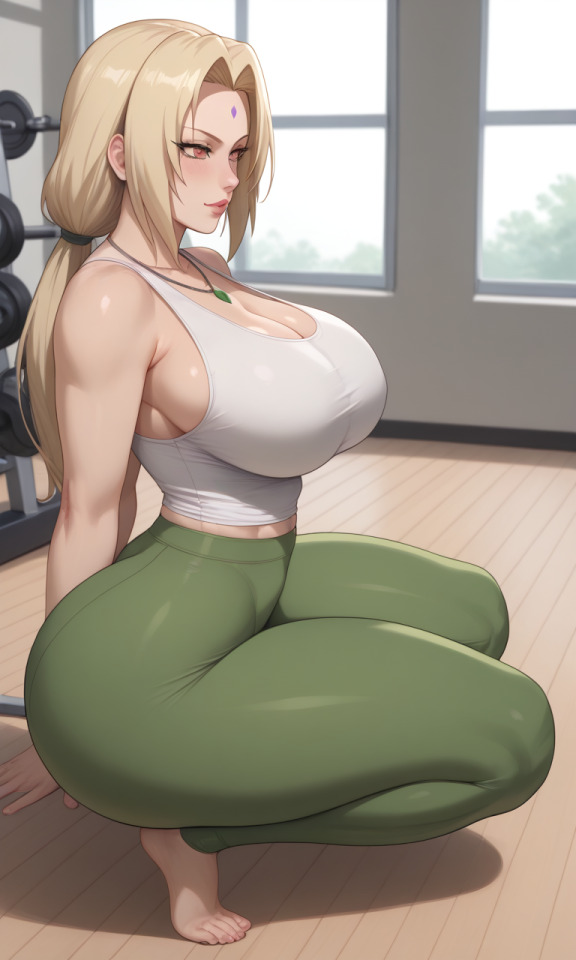
Tsunade x Gym Part 2 - thanks 4 the great feedback!
#ai generated#ai#ai artwork#ai art#ai waifu#ai mature#ai anime#ai woman#ai fanart#ai sexy#gymlife#gym body#gym#body shape#amazing body#curvy mature#curvy hips#curvy body#sexy thights#thick thights#great butt#huge butt#well trained#trainer#waifuanime#waifu#sexy waifu#anime#tsunade#sannin
434 notes
·
View notes